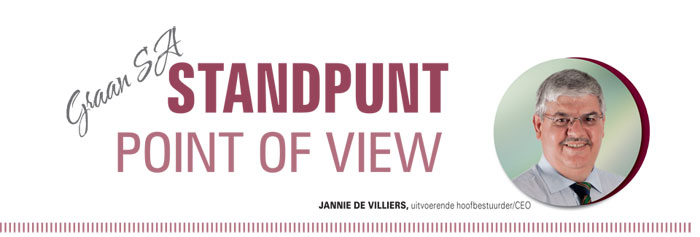November 2016

JANNIE DE VILLIERS, uitvoerende hoofbestuurder/CEO
Can a wet season in the northern part of the country be just as catastrophic as a dry year? Can our summer grain producers, who have to purchase inputs at ridiculous exchange rates, make a profit at export parity prices?
For a long time it has been a fact that one cannot repay the debt of one drought year in the subsequent year. The solution, unfortunately, does not lie in working harder. Working smarter also has its limitations.
Last year this time the drought was an enormous reality. Complaints about load shedding were lodged and antagonism against the agricultural sector was widely experienced. Currently it is believed that the drought will be over with the change of the season. There is less sympathy and more hope that the ‘drought problem’ will be something of the past when the first raindrops start to fall. Alas, in agricultural terms we know that it does not rain grass or maize. Lots of hard work still lie ahead and important production decisions will have to be made before planting commences.
The optimum planting period for the eastern regions has already started without any rain and the market price for maize is seesawing.
Some days I think – and I believe certain producers as well – of the Maize Board with nostalgia. All the energy was focussed on the maize price. As soon as it was determined and approved, producers could focus all their attention on the production process. It sounds quite simple when one thinks about it this way.
My eyes just now caught the headlines in the newspapers: Students denying themselves (and others) an education; politicians endeavouring to destroy one another to the detriment of our country and the economy. I wonder where the Minister would pitch the maize price had there been such a crowd of violent protesters outside his office?
One of the greater sins of apartheid was to deny people a proper education – which was wrong. What justifies it today? Wrong remains wrong, or what? With two kids at university I was wondering whether some of the class fees would be returned to me at the end of the year?
The grain industry is now experiencing numerous challenges. Important decisions will have to be made. Daily more and more uncertainties are added to the ‘decision making brew’ and when this concoction is stirred I am certain very few people would really want some of it. Our plans are perhaps getting fewer, but it definitely doesn’t mean that we don’t have any plans anymore.
Summer grains are also confronted with a number of challenges this year. The world’s grain stores are full to overflowing and the daily news reports excellent crops in the exporting countries. Summer grain prices are going to experience extreme pressure. We will most likely not be able to utilise all the available hectares for grain production. This way we can ensure that the yields of the good hectares compensate for the lower prices.
Grain farming in South Africa is not for sissies! The strength of the whole grain value chain is definitely tested in the proverbial furnace. The flavours emanating from this furnace will be an indication of the fabric we are made of.
The truth is that our salvation only appears when we are in the furnace and not while we are standing outside bickering with government. Daniel and his friends’ faith is probably a lesson for today: Though our Lord might not deliver us from the furnace, we shall still serve Him.
The battle is at its fiercest the moment just before deliverance. Hang in there, the outcome is near!
Publication: November 2016
Section: Features